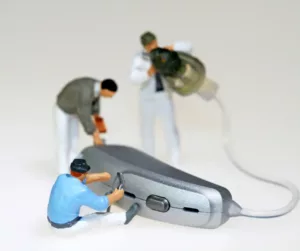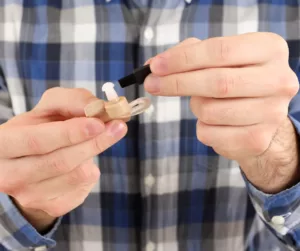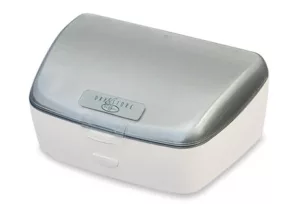Troubleshooting 101: Common Hearing Aid Repairs
Whether you’re looking at minor hearing aid repairs at home or seeking a reliable “hearing aid repair near me,” this guide demystifies common issues. Here, we delve into practical solutions for maintaining the optimal performance of your hearing aids. Stay tuned to learn how to tackle repairs with confidence.
Quick Fixes: Hearing Aid Repairs At Home
When minor issues arise with your hearing aids, there’s often a simple solution you can try at home. Here’s how to address some common problems before seeking professional help:
Low or No Sound
- Check the batteries are fresh and correctly installed.
- Ensure the battery door is fully closed on disposable models.
- For rechargeable models, confirm they are fully charged.
Feedback or Whistling
- Clean the earmold or receiver tube to clear wax or debris.
- Make sure the earmold fits snugly in your ear for BTE models.
- Verify that ITC or ITE models are not too deep in the ear canal.
Poor or Muffled Sound Quality
- Clean any wax from the earmold or receiver tube.
- Adjust the volume control.
- Confirm a snug fit of the earmold for BTE models.
- Check the insertion depth for ITC or ITE models.
Learn more about how to reduce ear wax.
Discomfort While Wearing
- Adjust the fit of the earmold or earplug.
- Ensure BTE earmolds aren’t too tight or loose.
- For ITC or ITE models, check for proper sizing in the ear canal.
Inspect for Blockages
- Examine your hearing aids under good light.
- Look for wax buildup near the microphone and sound outlet.
- For BTE models with tubing, check for cracks or moisture.
Final Fixes To Try At Home
- Turn the hearing aids off and on again.
- Reinsert your hearing aids carefully.
- Consider a new fitting if there have been changes to your ear or weight.
When to Seek Hearing Aid Repair Near Me
- If troubleshooting doesn’t resolve the issue
- If excessive feedback or whistling persists
- When you notice physical damage to the hearing aids
- If batteries drain faster than usual, indicating a potential repair need
Your hearing care professional can handle more complex repairs, often on-site, to minimize your time without the aids. If a manufacturer’s repair is needed, they’ll guide you on timelines and costs, especially if the warranty has expired.
Dealing with Moisture: Repairing Water-Damaged Hearing Aids
Dealing with moisture is critical for hearing aid maintenance. Here’s how you can manage and repair water-damaged hearing aids:
Preventing Hearing Aid Repairs From Water Damage
- Open the battery compartment and remove batteries nightly to air out your aids.
- Consider a hearing aid sleeve or sweatband if you live in a humid area or sweat heavily.
- Use a hearing aid dehumidifier to reduce moisture and extend the life of your aids.
- Insert hearing aids after showering and applying hair or face products to avoid buildup.
- Always remove hearing aids before swimming or water activities.
Immediate Action for Water Exposure
- Turn off the hearing aid and discard the battery immediately.
- Open the battery door and gently dry the hearing aid with a towel.
- If applicable, remove the tube and shake the aid to expel water.
Drying Process for Hearing Aid Repairs
- Use a fan or hairdryer on a cool setting to dry the aid, avoiding excessive heat.
- Allow the hearing aid to dry completely, which may take up to two days.
- Keep the battery door open and use a dehumidifier to accelerate drying.
If the Hearing Aid Still Fails
- Reuse the dehumidifier pot for additional drying time.
- Consult your hearing center for repair options, or send it back for professional repair.
Remember, prompt and proper care can save your hearing aids from lasting damage due to moisture.
Fix Hearing Aids’ Batteries
Managing the power supply for your hearing aids is crucial for optimal performance. Here’s a guide to addressing common battery issues:
Quickly Draining Batteries
- Lower the volume to conserve power.
- Limit audio streaming from other devices.
- Avoid noisy environments to reduce battery strain.
- Replace old batteries that won’t hold a charge well.
Poor Battery Contact
- Clean battery contacts with a dry cloth to ensure a good connection.
- Ensure correct battery insertion for proper function.
Leaking Batteries
- Remove and replace batteries if you notice leakage or discoloration.
- Clean the battery compartment to prevent damage to the hearing aid.
General Tips to Fix Hearing Aids’ Batteries
- Turn off hearing aids when not in use.
- Store them in a cool, dry place.
- Keep hearing aids away from extreme temperatures.
- Regularly clean your hearing aids to prevent dirt buildup.
For Rechargeable Hearing Aids
Follow the manufacturer’s guidelines for charging.
Use the charging station provided to avoid damage.
Contact a hearing care professional for further assistance if battery issues persist. These steps not only ensure your hearing aids function properly but also help save on costs over time.
Find out more in our rechargeable hearing aids guide.

Locating Reliable Hearing Aid Repair Near Me
When looking for hearing aid repairs at a location near you, a few key steps can ensure you choose the right one. Begin by seeking referrals from your hearing care professional, who may be able to fix hearing aids as well or may have a place they recommend. Additionally, reading online reviews provides insight into the reliability and quality of local shops. It’s also prudent to compare quotes from various repair shops to understand their service and price range.
Certification is another crucial factor. A certified shop, especially one recognized by the Hearing Industries Association (HIA), meets high standards for quality. As you narrow your options, inquire about each shop’s experience, specifically how long they’ve been in business and their track record with hearing aid repairs. Understanding their expected turnaround time for repairs, warranty offerings, and pricing structure is essential. Always request a detailed written agreement that outlines the repair costs, estimated completion time, and warranty details.
Be cautious of free repair services, as this may indicate inferior parts or service. A lack of warranty or a multitude of negative reviews online are also red flags suggesting that the service may not be reliable. These tips will guide you in choosing a competent and trustworthy repair service for your hearing aids.
Understanding Hearing Aid Warranties and Repair Policies
Understanding the specifics of hearing aid warranties and repair policies can help you confidently navigate your device’s care and maintenance.
Hearing Aid Warranties
Hearing aid warranties typically cover manufacturing defects and quality for a period ranging from one to three years, with some manufacturers offering the option of extended warranties for an additional cost. If your device malfunctions or breaks within the warranty period, the manufacturer usually covers the repair or replacement, though you might be responsible for shipping and handling fees. It’s important to note that most warranties don’t cover issues such as accidental damage, loss, theft, improper use, maintenance errors, or normal wear and tear.
To get the most out of your warranty, keep your hearing aid clean and dry, have it serviced regularly by a professional, and carefully read the warranty and repair policy before purchasing. Should an issue arise, contact the manufacturer immediately to file a claim.
Types of Warranties
- Limited Lifetime Warranty: Typically covers all parts except batteries and earmold fittings, excluding damage from accidents, misuse, or abuse.
- Basic and Limited Warranty: Covers all parts except batteries, not including damage from normal wear and tear or cosmetic issues that don’t affect performance.
- Complete Warranty: Includes all parts and labor for damages incurred during everyday use, excluding water damage or intentional destruction.
- Third-Party Warranties: These are available for hearing aids less than five years old from insurers or alternative organizations, offering unlimited replacements for the device.
Understanding Repairs
When your hearing aid is out of warranty, manufacturers may still offer repair services with varying costs based on the type and extent of the repair needed. Always seek a certified hearing aid store, like American Hearing + Audiology, for any repairs.
Extended Protection
American Hearing + Audiology offers a comprehensive concierge hearing service plan that provides extensive hearing care benefits. Members receive an array of services for a monthly fee of $35 or an annual fee of $375. These services include annual hearing tests, additional diagnostic tests if needed, unlimited office visits, and hearing aid cleanings. Also included are programming adjustments, real-ear verification, loaner hearing aids during repairs, Bluetooth support, up to two ear irrigations per year, batteries, wax traps, ear domes, and two receiver replacements annually. Our plan also provides discounts on an extended warranty and hearing aid repairs. We ensure that clients have consistent access to quality hearing care and device maintenance.

Need Hearing Aid Repair Or Replacement?
As you navigate the intricacies of hearing aid care, maintenance, and repair, you must recognize when repairs are becoming too frequent or costly. If you find yourself repeatedly having to fix hearing aids, or if the cost of repairs approaches the price of a new device, consider purchasing a new hearing aid. Modern devices offer the latest technology and may improve your hearing experience significantly.
At American Hearing + Audiology, we understand the importance of reliable hearing aids and helping you improve your hearing. Whether you need repair services for your current aids or are considering an upgrade, our team of experts is here to provide the support and guidance you need. We invite you to make an appointment with us and explore your hearing aid repair or replacement options. Let us help you ensure your hearing aids function optimally so you can enjoy the sounds of life to the fullest. Contact American Hearing + Audiology today to begin your journey to improved hearing.




